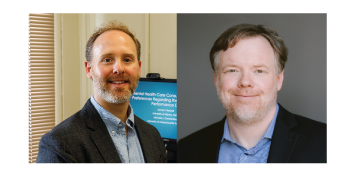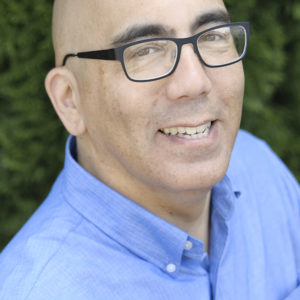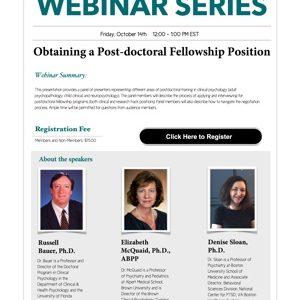Deliberate Practice for Cognitive-Behavioral Therapy: Training Methods to Enhance Acquisition of CBT Skills (with CE)
$40.00
Presenters: Drs. James Boswell and Tony Rousmaniere
Dr. Boswell is an Associate professor in the Department of Psychology at the University at Albany, SUNY, and an Associate of the Center for the Elimination of Minority Health Disparities (CEMHD). Dr. Boswell is president-elect of the North American Society for Psychotherapy Research (NASPR), and serves on the editorial boards of Behaviour Research and Therapy, Behavior Therapy, Psychotherapy Research, Psychotherapy, and the Journal of Clinical Psychology. He has published extensively in the areas of psychotherapy process and outcome, measurement-based care, and practice-oriented research. His work has been funded by the Patient Centered Outcomes Research Institute (PCORI), National Institute of Mental Health (NIMH), Robert Wood Johnson Foundation (RWJF) and the American Psychological Association (APA). He is also a member of the Advisory Committee to the APA Mental and Behavioral Health Data Registry (MBHR). In addition, he served as a technical expert panelist on the government-sponsored white paper prepared for the U.S. Department of Health and Human Service and the Office of the Assistant Secretary for Planning and Evaluation (ASPE) on Strategies for Measuring the Quality of Psychotherapy.
Dr. Rousmaniere is Clinical Faculty at the University of Washington and has a private practice in Seattle. He runs the psychotherapy training website www.dpfortherapists.com and provides workshops, webinars, and advanced clinical training and supervision to clinicians around the world. Dr. Rousmaniere is the author/co-editor of four books on deliberate practice and psychotherapy training and the forthcoming book series “The Essentials of Deliberate Practice” (APA Press). In 2017 he published the widely-cited article in The Atlantic Monthly, “What your therapist doesn’t know”. Dr. Rousmaniere supports the open-data movement and publishes his aggregated clinical outcome data, in de-identified form, on his website at www.drtonyr.com. A Fellow of the American Psychological Association, Dr. Rousmaniere was awarded the Early Career Award by the Society for the Advancement of Psychotherapy (APA Division 29).
Overview: Psychotherapists credit effective supervision as the single most important contributor to their professional development (Orlinsky & Rønnestad, 2005), and experienced therapists continue to seek supervision and consultation even when they are no longer required to do so (Lichtenberg, Goodyear, Overland, & Hutman, 2014). However, as currently practiced, effective supervision is not necessarily common. For example, supervisees report that a large proportion of their supervisors are ineffective and occasionally harmful (Ellis et al., 2014), and the success of supervision, as evidenced by improved client outcomes, is yet to be convincingly established (Watkins, 2011). In fact, Rousmaniere et al. (2016) found that supervision accounted for less than 1% of the variance in treatment outcomes in one large clinic. Addressing this gap, this webinar aims to improve the effectiveness of supervision and clinical training via a model for using deliberate practice to enhance trainees’ acquisition of core CBT skills. Deliberate practice proffers that the quality of practice is just as important as the quantit– expert-level performance is primarily the result of expert-level practice. Backed by decades of research on a wide range of other professions, from sports to math, medicine, and the arts, deliberate practice may help psychologists achieve higher levels of skill mastery. More specifically, deliberate practice is a highly structured, intentional activity with the specific goal of improving performance through behavioral rehearsal and graded stimuli, combined with immediate feedback (e.g., Rousmaniere, 2016, 2018).
Learning Objectives:
- Describe the research support for, and basic principles of, implementing deliberate practice in psychotherapy.
- Apply deliberate practice principles in the CBT training and supervision process.
- Utilize observations from the deliberate practice process to inform evaluations of trainee competence.
CE Credits Available: 1.0
Attendees must attend the entirety of the program and complete the Evaluation sent after the program. Evaluations will be sent via email shortly after the Live webinar. CE Certificates will be processed and emailed within 5 – 10 business days from Live Webinar.
Cost: Free for Members and $50 for Non-Members (NOTE: Members must be signed in to get the discounted rate. If you have trouble signing in, contact us).
PLEASE NOTE: You must sign in to receive Member discount. After purchasing, you must follow the link in your receipt provided to REGISTER for the webinar via Zoom. It is a 2-step process. If a link does not appear, contact us.
Cancellation Policy: No refunds will be provided except when SCP cancels the webinar.
Dr. Boswell and Rousmaniere nor the Society of Clinical Psychology, Division 12 have commercial support for the content of this webinar including endorsement of products, conflict of interest including but not limited to research grants, royalties for books or training, commercial support from companies or pharmaceutical sponsorship.
If you require any special needs assistance, please contact the SCP Central Office at [email protected].
Description
Presenters: Drs. James Boswell and Tony Rousmaniere
Dr. Boswell is an Associate professor in the Department of Psychology at the University at Albany, SUNY, and an Associate of the Center for the Elimination of Minority Health Disparities (CEMHD). Dr. Boswell is president-elect of the North American Society for Psychotherapy Research (NASPR), and serves on the editorial boards of Behaviour Research and Therapy, Behavior Therapy, Psychotherapy Research, Psychotherapy, and the Journal of Clinical Psychology. He has published extensively in the areas of psychotherapy process and outcome, measurement-based care, and practice-oriented research. His work has been funded by the Patient Centered Outcomes Research Institute (PCORI), National Institute of Mental Health (NIMH), Robert Wood Johnson Foundation (RWJF) and the American Psychological Association (APA). He is also a member of the Advisory Committee to the APA Mental and Behavioral Health Data Registry (MBHR). In addition, he served as a technical expert panelist on the government-sponsored white paper prepared for the U.S. Department of Health and Human Service and the Office of the Assistant Secretary for Planning and Evaluation (ASPE) on Strategies for Measuring the Quality of Psychotherapy.
Dr. Rousmaniere is Clinical Faculty at the University of Washington and has a private practice in Seattle. He runs the psychotherapy training website www.dpfortherapists.com and provides workshops, webinars, and advanced clinical training and supervision to clinicians around the world. Dr. Rousmaniere is the author/co-editor of four books on deliberate practice and psychotherapy training and the forthcoming book series “The Essentials of Deliberate Practice” (APA Press). In 2017 he published the widely-cited article in The Atlantic Monthly, “What your therapist doesn’t know”. Dr. Rousmaniere supports the open-data movement and publishes his aggregated clinical outcome data, in de-identified form, on his website at www.drtonyr.com. A Fellow of the American Psychological Association, Dr. Rousmaniere was awarded the Early Career Award by the Society for the Advancement of Psychotherapy (APA Division 29).
Overview: Psychotherapists credit effective supervision as the single most important contributor to their professional development (Orlinsky & Rønnestad, 2005), and experienced therapists continue to seek supervision and consultation even when they are no longer required to do so (Lichtenberg, Goodyear, Overland, & Hutman, 2014). However, as currently practiced, effective supervision is not necessarily common. For example, supervisees report that a large proportion of their supervisors are ineffective and occasionally harmful (Ellis et al., 2014), and the success of supervision, as evidenced by improved client outcomes, is yet to be convincingly established (Watkins, 2011). In fact, Rousmaniere et al. (2016) found that supervision accounted for less than 1% of the variance in treatment outcomes in one large clinic. Addressing this gap, this webinar aims to improve the effectiveness of supervision and clinical training via a model for using deliberate practice to enhance trainees’ acquisition of core CBT skills. Deliberate practice proffers that the quality of practice is just as important as the quantit– expert-level performance is primarily the result of expert-level practice. Backed by decades of research on a wide range of other professions, from sports to math, medicine, and the arts, deliberate practice may help psychologists achieve higher levels of skill mastery. More specifically, deliberate practice is a highly structured, intentional activity with the specific goal of improving performance through behavioral rehearsal and graded stimuli, combined with immediate feedback (e.g., Rousmaniere, 2016, 2018).
Learning Objectives:
- Describe the research support for, and basic principles of, implementing deliberate practice in psychotherapy.
- Apply deliberate practice principles in the CBT training and supervision process.
- Utilize observations from the deliberate practice process to inform evaluations of trainee competence.
Attendees must attend the entirety of the program and complete the Evaluation sent after the program. Evaluations will be sent via email shortly after the Live webinar. CE Certificates will be processed and emailed within 5 – 10 business days from Live Webinar.
Cancellation Policy: No refunds will be provided except when SCP cancels the webinar.
Dr. Boswell and Rousmaniere nor the Society of Clinical Psychology, Division 12 have commercial support for the content of this webinar including endorsement of products, conflict of interest including but not limited to research grants, royalties for books or training, commercial support from companies or pharmaceutical sponsorship.
If you require any special needs assistance, please contact the SCP Central Office at [email protected].






Reviews
There are no reviews yet.